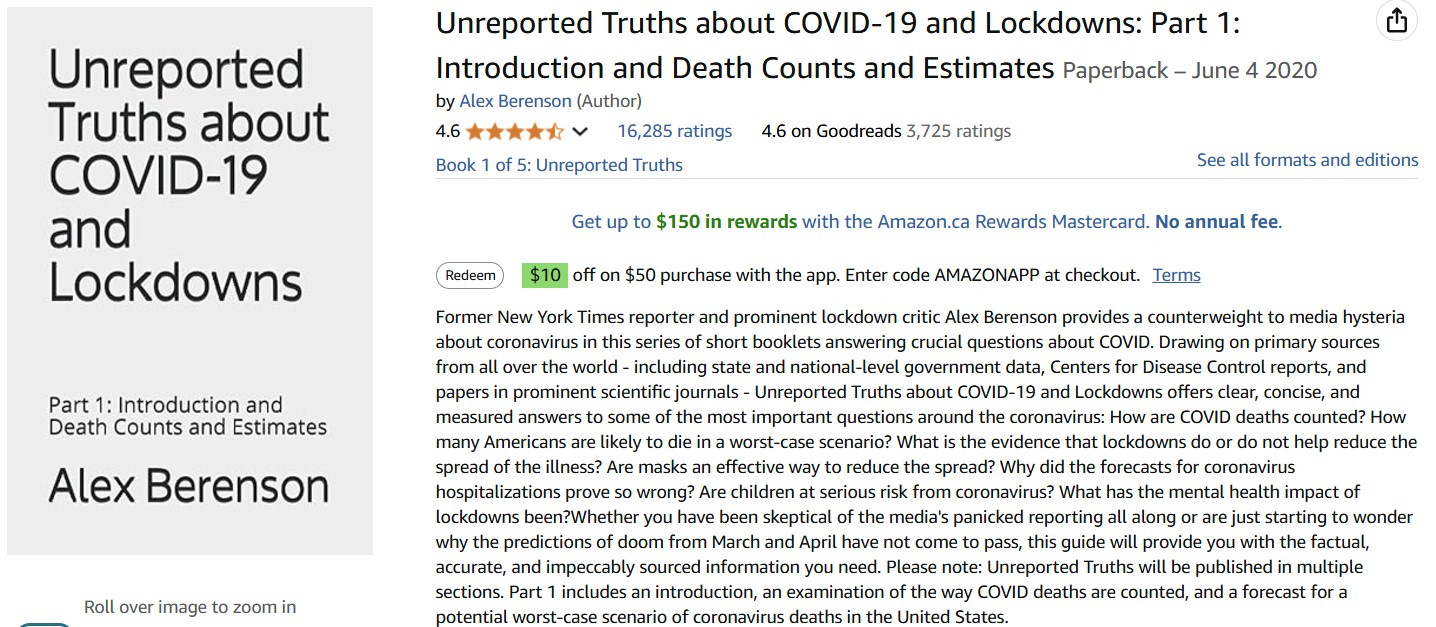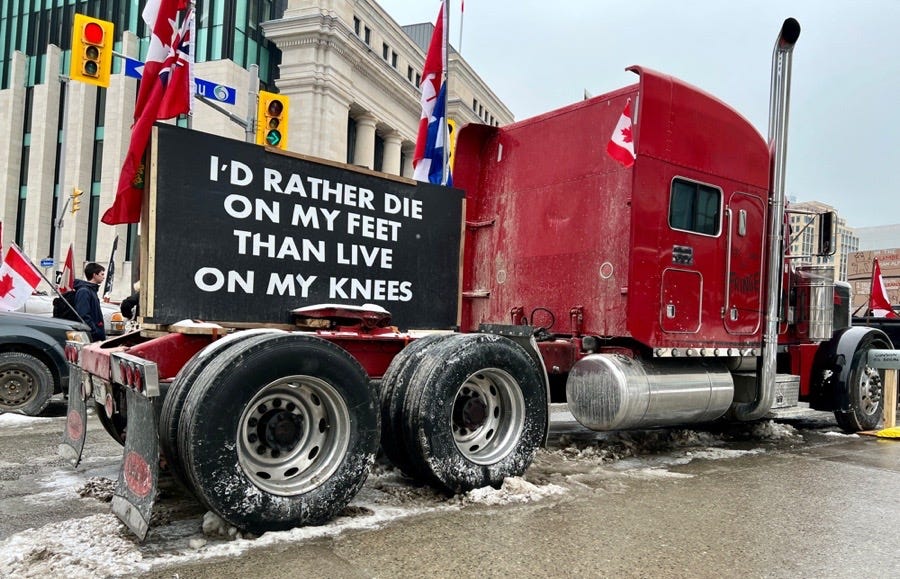Resisting Pandemic Fear Propaganda and Standing up to Social Pressure
You simply have to be sceptical of everything and by 2020, I'd been doing that for a very long time
I am a professional biologist and it’s my job to be sceptical.
And as I’ve mentioned, I grew up as a third child in an extremely liberal family that discussed all kinds of topics. Always at high risk of ridicule by my two older siblings, I learned early on not just to see all sides of an issue but to look for them before taking a position — well before opening my mouth about it.
In fact, by the time I was five or six, my fear of sibling ridicule was so strong I’d developed an incipient stutter – when I even thought about wading into a family discussion, my jaw would quiver so violently I knew I’d be unable to speak.
Before she died, my mother apologized for allowing that bullying to go on within the family, explaining she’d so enjoyed the intellectual banter with the older kids that she hadn’t really given much thought to the mockery being used to silence and exclude me. However, it’s also true that if I hadn’t gone through all that, I wouldn’t be who I am today.
At school and even at university in my undergraduate days, I rarely voiced an opinion even when I had one. My jaw-quivering didn’t totally disappear until I was in my mid-20s, so I always found it easier to express myself in writing. My penchant for thoroughly researching issues not only made me an effective writer overall but a good scientist, regardless of the topic at hand.
I’m convinced this is why I was able to resist the intense fear-mongering associated with the pandemic from the outset, when others around me did not — I looked for as much information as I could find even as the first nuggets of news were trickling in, just as I had done when I encountered polar bear propaganda.
As a result, by mid-March 2020, I was filled with a profound anxiety about where the bizarre lockdown decisions being made by governments would lead rather than a fear of the virus itself. But given the history of the developments, my reaction made total sense even if it was not what most people were thinking.
In January 2020, we started to hear about a new kind of viral pneumonia killing people in China. But since we know that communist China completely controls their news narrative, why would we take at face value anything they reported on this topic? I certainly did not.
Then, by early March the virus from China spread to Italy and Seattle in the US, and the truth was there for everyone to see, if they read the news carefully, as I did. The people who were dying were the elderly over 80 years old and the severely infirm of all ages, not the general population. Even though I had just turned 65 years old at the time, I was healthy except for mild asthma and being overweight. I certainly did not feel threatened.
There was another factor to take into account here — not only was I living close to ‘ground zero’ for the virus in North America, I also had some insider information not available to others.
Victoria, where I live, is very close to Seattle, Washington and in early 2020, there were several direct flights between the cities every day, as well as a ferry. By late January, Seattle was ground zero for this virus in the US and records show it had been spreading for at least a month before any significant containment measures were taken. It seemed highly likely to me that the virus would spread early to Victoria and other areas of southern British Columbia, which might put myself and family members at risk, so I paid close attention to media reports and journalists on Twitter about what was going on in Seattle and Italy.
My “insider” information came from the fact that a business colleague of mine had a family member in the Kirkland care home that was at the centre of the Covid outbreak in Seattle: in early March, several family members got sick and one elderly relative died. This close connection meant I was getting daily updates on that situation, which provided important information on the real risk factors involved.
In the summary below from a blog post I wrote in April, the names have been changed to protect the privacy of those involved:
Ninety-year-old Dorothy [recovering from surgery in the Kirkland care home] was exposed continuously to high doses of virus from her sick roommate, all day and all night, and died quickly despite hospital treatment. [Dorothy died of Covid March 8, days after the death of her coughing roommate.] Her daughter, Mary [in her late 60s], was exposed to high doses of the virus during her daily one-to-two-hour visits to Dorothy, developed a moderately severe illness but recovered quickly in hospital.
Mary's husband David, who had been exposed continuously to Mary both before and after Mary showed symptoms, developed only a mild case of the illness [night sweats] and recovered without incident at home. David did not pass the virus along during a single visit he made to his elderly parents before he knew he might be infected, unless they had it without symptoms (since it appears they were not tested). My summary, published April 24, 2020.
In other words, for the one example I knew about in detail during the early stages of the pandemic when the illness was most deadly, only the extreme elderly infected persons in the care home died and the risk to everyone else along the line of exposure diminished markedly over age and time.
Even by late March, it was apparent that Covid-19 killed the elderly who were close to death already and others with serious health issues. Not everyone, as China and some public health officials seemed to imply. Oddly, the first severe outbreaks in Canada by that time were in the east: in Ontario and Quebec care homes (via cases in New York), not in southern British Columbia as I’d expected.
Then Italy suddenly locked down all healthy people as China had done and within a matter of weeks in late March, many countries, including Canada, followed suit. Officials seemed convinced this lockdown strategy would help. I was not.
I went out in my community as I had before, as much as local closures of businesses would allow. I shopped, did in-person banking, and walked local hiking trails. I couldn’t work because the University closed down, so I spent my time researching the Covid response worldwide.
I was an early follower of Alex Berenson’s posts on Twitter, and bought his pamphlet books summarizing his journalism as soon as they came out, starting in early June 2020.
Unsurprisingly, what I learned was that despite lockdowns, tens of thousands of elderly around the world still died.
Suddenly, the media were counting the daily ‘Covid dead’ in a surreptitious demand that people forget that before this virus, thousands died every single day of myriad causes.
People were covertly told to forget that seasonal influenza sickens millions every year, kills thousands and sends even more to hospital. But I knew what flu could do. I’d been extremely ill with flu at least twice in my life: both times were truly awful—fever, cough, weakness, shortness of breath—and complete recovery took months. My mother died from complications of flu, as did my great aunt.
I knew flu could be debilitating and even deadly.
Everyone was more or less encouraged to treat Covid as if it were Ebola, which seemed like deliberate fear-mongering. And when the ‘experts’ pushed the idea that people without symptoms were as effect carriers of the illness as those with a tell-tale cough and fever, I wondered why they were trying make people fear each other.
As I knew from my colleague’s family experience in Seattle, this notion of “symptomless carriers” didn’t seem to be true at all, and biologically made little sense.
At the same time, our provincial government in Canada hid from us precisely where outbreaks in BC were occurring. They said this was to prevent panic and discrimination, which made me very suspicious. When they later told the truth, it turned out that First Nations reserves, care homes for the elderly, and meat packing plants employing immigrants were the hotspots, not the towns and cities where people were being forced into lockdown.
Then came the mask madness. Suddenly, people were told to forget knowledge that two-layer surgical masks don’t protect against minute virus particles. They bizarrely insisted we must now accept that a single thin layer of woven material over nose and mouth—a simple cloth mask—would protect against miniscule particles of Covid-19. As a biologist, I knew this was ridiculous and that the masks were for some other purpose altogether. A test of compliance, perhaps, or a security blanket for all the people they’d terrified into staying home.
I have mild asthma and our government regulations stated explicitly that this medical condition made me exempt from mask mandates. I refused to wear a mask despite huge public pressure to “go along to get along”—to comply because seeing a maskless face might make some people uncomfortable.
I felt the opposite was true: that seeing people without a mask would remind many of their humanity and perhaps reduce their fear.
My own brother, who has more severe asthma than me, said he always wore a mask despite it causing him considerable difficulty breathing. He told me I should “just wear the fucking mask.” My sister also knuckled under the social pressure.
But knowing that masks were useless against viruses, on top of the fact that the regulations specifically exempted me from this edict, meant I just couldn’t comply to make other people feel better. It got me kicked out of some local stores and locked out of the lab at the University of Victoria that I needed to earn a living, but I stood firm.
I shouldn’t have been surprised that even though the university bent over backwards to accommodate any student with the slightest disability – which included dubious claims of ADHD or anxiety disorders – they couldn’t bring themselves to let me go maskless, as per government regulations, even when almost everyone else was working or studying off campus. [I did put in a human rights abuse claim but it was dismissed, as were virtually all others.]
And then came the ultimate gaslighting: an entirely new type of vaccine was offered after minimal testing. Everyone was expected to accept, without question, that this mRNA vaccine was entirely “safe and effective.” I was not at all convinced. I read the news of the vaccine rollouts in Israel and the UK, which happened long before Canada had a supply to offer its citizens.
We were expected to accept the assurances of officials that the vaccine provided better protection against illness than having survived the illness itself, which made very little sense scientifically. The red flag events (side-effects and deaths) were mounting, and I wondered what part the World Economic Forum (WEF) played in all this, after the research I’d done for my book on Sir David Attenborough and the walruses falling from a cliff to their deaths, which my research had shown had been falsely blamed on global warming.
For me, the final straw came when pregnant women and children were pressured to accept the vaccine without being told it had not been tested on pregnant women or children. This was not only unethical but an immoral and unacceptably dangerous risk that medical science had rejected decades ago. No drugs are tested on pregnant women, and few are even tested on nonpregnant women.
Children’s bodies and brains are actively growing: what ethical doctor would knowingly take a chance of interfering with their normal development for the dubious benefit of preventing a mild flu? I knew then that something really nefarious was afoot, even if I didn’t understand exactly why it was happening or who was behind it.
And, in many places, it only got worse from there. In 2021, informed consent went out the window as coercion and mandates replaced incentives to be vaccinated. When the Covid vaccines finally came to Canada, I knew I would never comply, even if it cost me my job. Ironically, the system the University had chosen to track and enforce their vaccine mandate made it impossible to include outside contractors like me, so I was free to work once the mask mandates were lifted.
However, I was not free to travel by train or plane anywhere within Canada. I couldn’t leave the country. Most restaurants and other public facilities like gyms and swimming pools demanded proof of vaccination, so I could do little else but work, shop for groceries, go for long walks, and entertain myself and family at home.
It was even worse for my daughter, who works in health care. She was under huge pressure to comply with vaccine mandates but felt exactly as I did about the shots: no way was she going to comply. We were very much in the minority in our respective communities and both of us felt isolated from friends and colleagues over the issue.
But in January 2022, the Canadian Truckers Freedom Convoy showed us both that although we felt marooned in our misery, surrounded as we were by a very high percentage of willing compliance, we were actually far from alone.
After tracking the travel of the huge Freedom Convoy across Canada, on my 68th birthday, my daughter and I attended an anti-vaccine mandate protest in Victoria organized in parallel with the Ottawa Freedom Convoy on January 29, which drew around 10,000 people from across Vancouver Island.
My daughter was 39 years old and it was the first political protest she’d ever attended, which meant we were both novices. Of all the potential social issues I’d lived through over the previous five decades or so that might have motivated me to take a public stand, this was the first and only one that got me to share my outrage and anger with a crowd of strangers.

It was something I truly never thought I’d experience. My mother – ever a fighter for social injustices – would either have been proud of us both, or truly horrified.
However, those who were behind this lockdown madness should take note. I wasn’t the only person who learned they had it within themselves to resist this kind of manipulation and stand up against it, even a little bit. Try it again and I’ll be in fighting mode and ready to act from day one, rather than seething quietly to myself.
Happy New Year everyone! Be optimistic for better times ahead.
The easiest thing you can do to support Biology Bites is to click the “♡ Like”. The more likes = the higher this post rises in the Substack feeds, which puts Biology Bites in front of more readers.







I got the shots and wore a 95 mask while my wife's immune system was low during her cancer treatment, because I interacted with older people and was at a vulnerable age myself. I saw three younger friends get nasty problems with long-covid. Over 700,000 people in the U.K. medical system had long-term-covid after two years, as reported a few months ago. We need to look on the experience, and its faults, as practice when we get a very serious outbreak that kills much larger numbers of people of all ages..